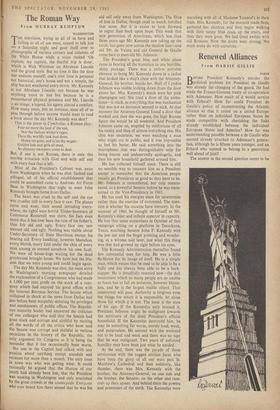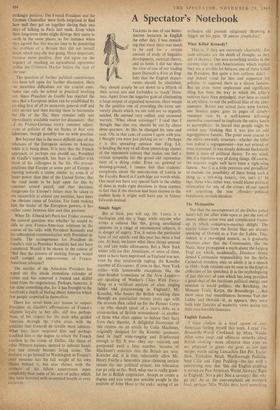Renewed Alliances
From DARSIE GILLIE
PARIS
EFORE President Kennedy's murder the D political problem for President de Gaulle was already the changing of the guard. He had made the Franco-German treaty of co-operation with Adenauer. How much of it would survive with Erhard? How far could President de Gaulle's policy of reconstructing the Atlantic alliance so that it rested on a united Europe rather than on individual European States be made compatible with cherishing the links already established between the individual European States and America? How far was understanding possible between a de Gaulle who seemed already attached to Adenauer's genera- tion, although he is fifteen years younger, and an Erhard who seemed to belong to a generation well ahead of Shim?
The answer to the second question seems to be
strikingly positive. The Freuch President and the German Chancellor were both surprised to find how well they got on together during their two days of talking in Paris last week. Even when their long-term views might diverge they came to earth in the same places, as for instance when they agreed that this was no time to be pondering the problem of a Britain that, did not herself know which way she was going. More important, because more positive, they did agree on the urgency of reaching an agricultural agreement ti ithin the Common Market before the turn of ihe year.
The question of further political construction has been left open for further discussion. Here he unsettled difficulties are the crucial ones. some can only be solved in practical working out. Since President de Gaulle has rejected the idea that a European union can be established by creating first of all its economic general staff and civil service and then leaving these to harmonise the life of the Six, there remains only one immediately available matter for discussion: that of the Franco-German treaty, constant adjust- i-.ent of policies of the six States, at first very laborious, though possibly less so with practice.
But beyond this is the more difficult one of the relations of the European nations to America while it is being done. It is here that the French approach, or perhaps one should say, President de Gaulle's approach, has been in conflict with those of his colleagues in the Six. His presup- positions that Europe or some part of Europe is moving towards a status similar to, even it of lesser power than that of the United States; that the road needs to be kept open for this by constant armed patrol, and that decisions dangerous for Europe's future may be taken in the meanwhile at almost any moment, have been the obvious cause of friction. Far from making him the leader of the European powers, it has rather conic between him and that position.
When Dr. Erhard left Paris last Friday e/vening• the natural question was whether he would be able to ease Franco-American relations in the course of his talks with President Kennedy and his subsequent communication with President de Gaulle. The arrangements for President de Gaulle's visit to President Kennedy had just been completed. Would it be shown in the course of 1964 that the process of making Europe would itself compel an improvement of Franco- American relations?
The murder of the American President has wiped out this whole immediate calendar of events and has removed a trusted and skilful hand from the negotiations. Perhaps, however, it has done something else, for it has brought to the forefront a depth of feeling about America which few peOple suspected in themselves.
There has never been any reason to suspect President de Gaulle's affirmations of France's
ultimate loyalty to her ally, still less perhaps those of his respect for the man who, guided America through the Cuba crisis with the
qualities that General de Gaulle most admires.
What may have surprised him and perhaps troubled him is the degree to which the French
reaction to the crime of Dallas, like those of other Western nations, seemed to indicate bonds that had already become living tissue. The
decision to go himself to Washington as France's chief mourner has the full weight of his own choice behind it, but also chimes with the
instincts of his fellow countrymen more completely than some of his acts of policy which they have watched with suspended breath or even irritation.































































 Previous page
Previous page